Alexander the Great: The True King of Fate/Zero

Anime has been known for adapting elements from historical figures and events to help curve the story in a certain direction. One of the most notable is Fate/Zero, a TYPE-MOON light novel adapted into a TV series by ufotable in 2011/2012. I won’t give you a detailed description of the show since you’ve probably seen it if you’re reading this, but here is a brief description just as a refresher: seven mages are each granted a servant, heroic spirits who are historical figures. The chosen mages fight for control over the Holy Grail, a magical item that can grant wishes. Now, there are three heroic spirits that are connected to this article: Archer, Saber, and Rider (Gilgamesh, Arthur Pendragon, and Iskander the Conqueror/Alexander the Great respectively). Each one has a motive driving them to retrieve the grail, paralleling their respective psychologies as kings.
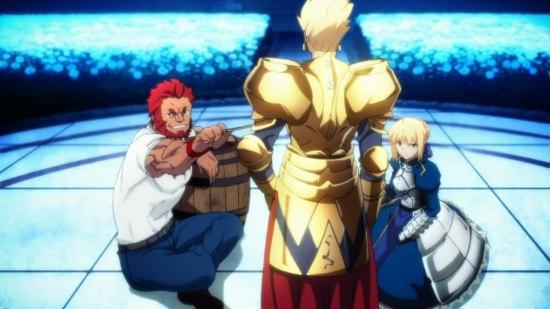
In the eleventh episode titled “Discussing the Grail/The Grail Dialogue”, these three kings drink in a castle garden, discussing the reasons they each have to covet the grail. Alexander the Great is the most notable since he controls the conversation at most points in the dialogue while Arthur is constantly refuted and Gilgamesh mocks the ideals that Arthur embodies. So let’s start with Arthur and her (yes, if you haven’t seen Fate/Zero, Arthur is a woman) motives to win the grail.
CAUTION: This will spoil parts of later episodes of Fate/Zero. You have been warned!
Saber

Compared to Alexander and Gilgamesh, Arthur is collected and polite. In regards to the setting, a depressing castle garden owned by the Einsbern mages, Arthur remains silent while Alexander and Gilgamesh comment on the terrible location. She is also easily irritable when it comes to Alexander and Gilgamesh’s comments and personalities. Now, Arthur’s perspective is unique in the sense that pursues martyrdom over glory. When faced with the question of what she seeks from the grail her answer is: “I want to avert Britain’s destruction.”
Saber, being a defeated king of Britain, believes she is the reason that her country fell. She wishes to stop herself from taking the throne in an attempt to change the results. The interesting concept about Arthur is that she is the only character to feel regret over how her life ended. In many texts of the Knights of the Round Table, Arthur was noted for being the noble sacrifice in the sense that he must take responsibility for his people. In Sir Gawain and the Green Knight, Arthur’s court was too frightened to accept the Green Knight’s challenge and only through Guinevere’s insistence does Gawain volunteer in Arthur’s place. 1 Arthur’s rule shows a saintly method of self-sacrifice, but this raises a question: is it right for a ruler to take on the responsibility of the people or should the people take the responsibility of the ruler?
Archer
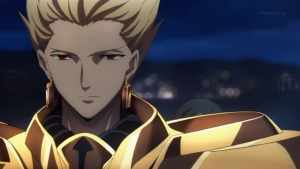
Gilgamesh serves as the trouble maker of the party. Gilgamesh, known for his subjective ruling style, mocks Arthur’s claims of heroism and martyrdom. In the beginning of the conversation, he is the most critical when discussing location and the drink they will be sharing. When presented with the barrel of wine Alexander retrieved from the market prior, Gilgamesh responded, “You really thought we could discern a hierarchy of heroic spirits with this swill?” Gilgamesh’s Noble Phantasm is known as the Gate of Babylon, which represents his storehouse of weapons and resources that he can access anywhere at any time. He even pulls his finest wine out of thin air, which both Arthur and Alexander compliment. Gilgamesh is showing his psychology as king, being someone who possesses the finest of goods and being superior to all in every way. His personality in this discussion reflects his idea of kingship perfectly. 2
Gilgamesh is interesting because he has no wish for the grail to grant. Instead, he views it as an object he once possessed and must prevent anyone from stealing it. “The Grail already belongs to me, all of this world’s treasures, without exception, trace their origins back to my treasure house.” Gilgamesh is pretentious in assuming he has possessed even the Holy Grail, which was created only several hundred years prior to the 1990s, the years the course of Fate/Zero takes place in. Even so, Arthur is annoyed by this statement while Alexander accepts Gilgamesh’s claim, instead claiming he will take it from him.
Rider
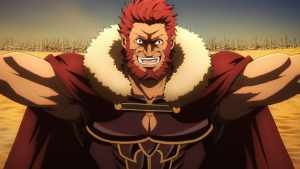
Alexander the Great shows the most enthusiasm in the conversation of kings and is the most important character in this episode. In a sense, he sheds light on the rationale behind the methods of brutal kings. Alexander shows his intelligence and well-read nature by being the one to propose a dialogue over combat. Philosophers would often fight on a mental landscape over a physical one, and shows his philosophical skills which he acquired from Aristotle. It should also be noted that Alexander reads frequently throughout the shows progression, including texts like The Odyssey.
Alexander shows a mutual respect among kings, as shown with how he humors Gilgamesh’s rude comments. He is the most talkative in the conversation and wishes to be reincarnated. Unlike Arthur, Alexander feels that the marks he left on history are what makes him a king, but ruling the modern world is a worthy wish.
Climax of the Discussion
“Did you hear that drivel rider!? Did you hear what this little girl, who calls herself King of Knights, said? Her beloved country to which she devoted her whole life!” – Gilgamesh
This quote from Gilgamesh embodies both his and Alexander’s thoughts on Arthur. The differing views of kingship is most evident here, as Arthur is opposed from both Alexander and Gilgamesh. Compared to her thoughts, Gilgamesh and Alexander believe that a country is devoted to it’s ruler and not the other way around. Arthur’s self-martyrdom shows her lack of understanding. This is emphasized by Alexander numerous times:
The king does not devote himself. It is the nation and the people who must devote themselves to the king. You have reversed the concept. – Alexander
Alexander, whose death is still a mystery, ended up with his empire being torn from the strife of civil war and his heirs being killed. Yet against Arthur’s comments, Alexander shows no regret. 3 Alexander is able to grasp the magnitude of the many soldiers who fought alongside him. Now, given that Arthur fought more for her people than with his people, she still feels it is her duty to not lead them at all, feeling inadequate. Perhaps her opinion is true that she could have done more, but it would serve as a disrespectful action towards her followers and fellow knights to undo their lives. “I shall never regret it – let alone undo it all! Such an act would be an insufferable insult to all those who fought and bled and died alongside me!” Alexander’s assessment is valid, but it is difficult to assess the feelings of those in the Round Table. Arthur does not know how others felt about her rule, and she assumes they agree that she was an inadequate leader. Arthur’s emotions of regret are invalid because doing so means Arthur disregards all the historical marks of her reign. Alexander understands from a king’s position that his impact on history should never be tarnished let alone undone. Arthur would be changing history, removing herself and many others from it.
Arthur is stunned by the two kings, as they speak like brutal tyrants. Alexander, recognizing the Arthur is disillusioned as to her role as a king, responds with a powerful statement about kings over the centuries:
We are heroes because we are brutal tyrants. However Saber, if a King regrets his rule, or regrets the matter to which his rule came to an end, that King is nothing but a fool, worse than the tyrants you disdain. – Alexander
Tyrants are cruel and oppressive, which is fitting for Gilgamesh, but Alexander was regarded as one of the greatest rulers in history. The reason he accepts this notion of tyranny is not that he was ruthless towards his people but that he understood what it meant to manage and control his people with a iron fist.
Arthur is viewed as weak and misguided for granting her knights mercy in spite of their wrongdoings. Arthur is thought to have died in the Battle of Camlann, where she was betrayed by one of her knights, Mordrid. 4 Other knights, such as Lancelot, also committed crimes but were pardoned or not rightfully punished (SPOILER: This also seems to be a foreshadowing of Arthur’s encounter with Berserker, who ends up being Lancelot, and how Arthur caused his descent into madness). If Arthur were stricter in her command, she may have been able to prevent being betrayed.
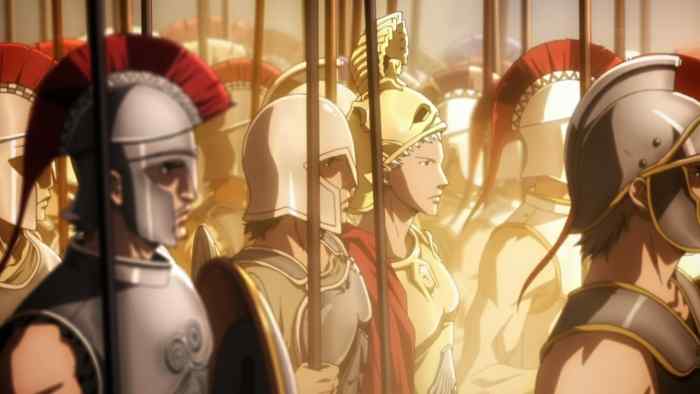
Alexander treats his soldiers as friends in arms but understands that discipline is key in ruling an empire. Alexander understands that a king must fight with his followers, that a true king must be on the battlefield with his men leading the charge to victory. Alexander’s Noble Phantasm, the ultimate weapon a heroic spirit wields, is the Ionian Hetairoi, the “army of the king” which embodies the spirits of every soldier that fought alongside him. It is not a weapon of his or great device but his bond with his soldiers that lead to his many victories.
When Hassan i-Sabbah, the Assassin heroic spirit, arrives, Alexander offers to invite them (i-Sabbah’s Noble Phantasm is multiple heroic spirits corresponding with his split personalities) to join only to be rejected. Alexander calls upon his Ionion Hetairoi to defeat the Assassin servants, and states to Arthur, “My bond is my greatest treasure, my path to kingship!” The bonds of true warriors holds strong for Alexander and is the greatest treasure that he will never regret, no matter how his reign ended. Alexander and his army easily dispatch the squadron of Assassins, knocking them out of the war first.
When the fighting has ceased, Alexander ends the discussion since he no longer recognizes Arthur as a king. “You’re just a little girl.” Arthur is shocked, but seems to realize maybe Alexander’s assessment is not completely incorrect. She never truly understood her allies or what they looked for in her. As far as Arthur’s ideals, Alexander regards it as qualities of “the highest saints” but does not view this as a method of leadership.
Alexander is the most significant character when regarding the position of kingship and what is the most fitting description of it. Alexander is able to disprove Arthur’s ideals in the misconstrued concept of what a king is to his/her people. They must be a tyrant full of greed and valor and fight with their people on the frontlines as a true leader should. A leader does not sacrifice themselves to protect those who cannot protect themselves. A leader does not forgive everyone without punishment. A leader must make the hard decisions and maintain his strength in the eyes of his people.
As Alexander takes his leave, Gilgamesh regards her agony as a “splendid and marvelous thing to look upon”. Her suffering is similar to that of a play that will entertain him for the remaining duration of the war.
It is interesting that Arthur is positioned as a girl in Fate/Zero, since Arthur’s rule seemed vastly different from most. In a way, it did seem like a more sensitive and saintly rule, without the tyranny and conquest that both Gilgamesh and Alexander embodied. Her rule, in comparison to the true legends of King Arthur, could be construed as feminine or sensitive. Arthur is left to doubt herself, acknowledging Lancelot’s perception of her as a king who does not understand how others feel. 5
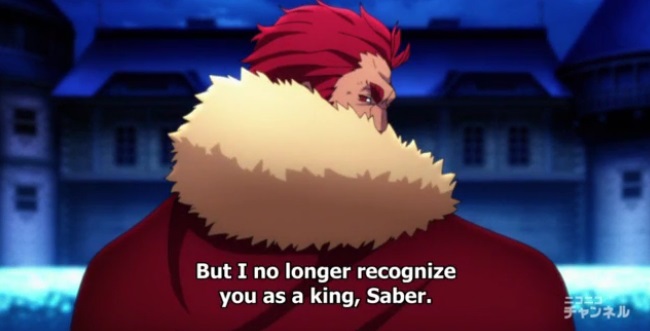
Do you think a king should be tyrannical if it means a more controlled and effective rule? Or is self-sacrifice a noble and admirable endeavor of a leader?
Works Cited
- Abrams, M. H. “Sir Gawain and the Green Knight.” The Norton Anthology of English Literature. Vol. 1. New York: W. W. Norton, 1968. N. pag. Print. ↩
- “Epic of Gilgamesh.” Wikipedia. Wikimedia Foundation, n.d. Web. 17 Oct. 2015. <https://en.wikipedia.org/wiki/Epic_of_Gilgamesh>. ↩
- “The Death of Alexander the Great, 323 BC.” EyeWitness to History. Ibis Communications, Inc, 2008. Web. 19 Oct. 2015. <http://www.eyewitnesstohistory.com/alexanderdeath.htm>. ↩
- “Battle of Camlann.” Wikipedia. Wikimedia Foundation, n.d. Web. 17 Oct. 2015. <https://en.wikipedia.org/wiki/Battle_of_Camlann>. ↩
- Aoki, Ei. “Discussing the Grail.” Fate/Zero. 12 Dec. 2011. Television. ↩
What do you think? Leave a comment.




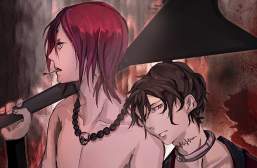


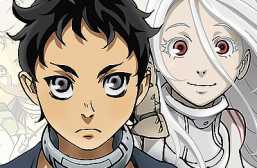

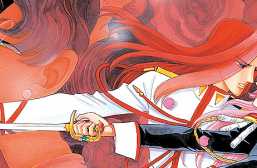
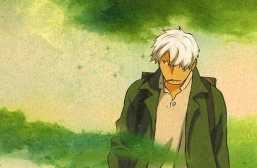
Alexander was one of my favorite characters from Fate Zero, I loved his theme song.
I watched the dub version of this show and it was quite well done. I liked Alex and Waver a lot they were my favorite duo in Zero, it’s so sad seeing all of these people fight for their dreams to come true yet, you know only one of them will survive. I was really counting on these two, though I wish I had decided to watch this before starting Unlimited Blade Works. That way I would have had the mystery of not knowing how this was going to turn out. It was a sad but, enjoyable end. Alex’s role in the Holy Grail War was a joy and gift not only to himself but, to Waver as well. I think they both gained a lot from their time with each other .
I gotta say after watching Fate Stay Night i had little hope for Fate Zero but oh how wrong i was. One of the greatest action animes iw seen and characters like Iskandar were the reason i was sad to see it end so soon.
He’s Alexander the Great with a reason.
After reading this article I decided to re-watch Fate Zero. It’s debatable for the best anime I’ve seen so far. It’s dialogue (dubbed) as highlighted in the article is quite thought provoking.
All right! Glad to see this got published. Once again, great article!
A king or any political ruler needs to have both. He/she needs to be ruthless when it comes to fighting for their people, but on the other hand… the ruler needs to fight for the people. If the ruler isn’t, then what’s the point? The people might as well up and leave or overthrow that ruler.
Excellent article! Some consider Alexander to be a minor character, but his importance is clearly seen here.
Rider is the character i love and respect the most in fate zero. Waver is so lucky to be with him. He learn a lot about life. I really love how heroic rider is.
It really is too bad that Alex the Great only makes an appearance in Fate Zero, he was a ‘great’ character to have. If only he played a role in Saber’s change in world views during the Stay Night events or afterwards. If there’s one thing that sticks out with this guy is his message that you don’t need the pedigree or the high and mighty attitude to be a King, it already exists within you. You just have to reach it. I place him in the same category as Kamina from Gurren Lagann.
the best character in Zero, and with the most saddest dead.
Throughout the whole series i found myself saying yes to everything he had to say. So much charisma i believed every word he said. Best anime character period.
i want to know if alexander appears in another anime other than fate/zero?
I don’t believed he appears in anything else of the TYPE-MOON universe. I do believe that I read somewhere that Taiga Fujimura ran into them during the time of Fate/Zero but I don’t recall where I saw it.
He was created as a complete person with his own thinking system.
Often times, I would have liked to hear how Rider would comment about the modern era, especially Japan. As compared to Rider’s era, he was summoned in country where slavery doesn’t exist, equality for both gender and race, humanitarian deeds is a natural occurrence, and so forth.
In Rider’s era, something like the slaughter or enslavement of children, especially of an enemy nation, was common; and it was worth noting he likely wanted to conquer Japan. So I can guess it makes him happy as Waver had cried for the dead children found in Caster’s lair, since it would likely be rare for a foreigner to cry for another nation’s children in Rider’s era.
Of course he wants to conquer the modern age as he stated in the episode referenced in this post. He doesn’t make too many comments I recall about the new age probably like how he respects the rule of other kings like Gilgamesh. At no point does Gilgamesh say something like “you’re wrong and I’m right” to Gilgamesh in regards to their perceived kingship (of course I can’t say the same for Saber). He does reference how his biggest enemy would be Bill Clinton but doesn’t make any comments criticizing him. He probably respects the changes to the world but that won’t stop him from conquering and implementing his authority over it!
Alexandros is his real original greek name… He was a genious in real life… Persians and the Egyptians used to call him as Iskandar… He is so awsome!
Alexander is kinda like that father or older brother you always needed but never had in your childhood. He’s the partly the reason Waver become mature and strong later, the other half was the potential Alexander saw inside him.
He is definitely the most badass servant in Fate Zero!
I absolutely loved this episode of Fate/Zero. The three kings each have a unique philosophy for rule and made me enjoy them individually (including Gilgamesh!). The Fate series is definitely interesting in lore!
Great analysis! I found many of the philosophical discussions on Fate/Zero to be mentally taxing and confusing, but this was one that stuck to me. It’s hard to define what makes a good leader. I found truth in both opinions, that a leader should be a figure of splendor and decisiveness that leads their people. At the same time I feel a leader should be connected to the people, able to listen to their demands and sacrifice themselves if needed for the good of the nation. If there is a gray area in between, that would be idealistic. Overall I loved Fate/Zero and it’s blend of history and fantasy, and look forward to more iterations of it.
This looks like a great show.
This would be a fine analysis if it wasn’t for the fact that Urobuchi(as he himself stated) never understood Saber as a character. Instead he just made her in the character that everyone shits on(he has one of those in every single series he writes), a naive character that serves as a ragdoll for others to mock, often making those characters super idealistic since butcher dislikes that.
Thing is, Saber was gentle but at the same time ruthless(much like Mind of Steel Shirou at some points), for the greater good of the kingdom. And out of the three Saber was the best ruler and in fact she is described as being a perfect King, in fact she sas TOO perfect which is why the people in Camelot shat the bed by not being able to understand her and believe she was some sort of miracle machine(which is why she hits it off with Shirou, another machine that just happens to live for a more beautiful ideal). However all of them regret it deeply and blame themselves for the falling of britain, wishing to atone for their sins and serve her again.
Alexander might seem right in the things he said, but the problem is that he’s just talk. He never accomplished anything and the things he say might seem cool or inspiring but are proven wrong again and again. He’s basically a delusional dictator, a charismatic one but still delusional. He is an interesting character because of this though, because he honestly believes all this and he has a charisma that might make you agree with him if you don’t know the whole picture.
Shame I can’t say the same about Gilgamesh, that fails to compare to complex characters like Saber or Alexander that have more than 1 dimension. Gilgamesh is basically 14 y/o wet dream, his ideals are stupid and the way he acts is just as bad. I mean if we into his plans of killing humanity to make it prosper you’ll realize that it makes no sense culling the “weak” humans because what he basically wants is DBZ people around, but what about doctors, engineers and other “weak” people? Meh, bit of a side rant and I could go on about his ideal of being a king and what he does with it but point being, Gilgamesh is pretty dumb as a character.
The personalities of these characters reflect the factual characters, that is the intent of this review. I don’t really understand some of your comments since Alexander’s statements have merit since he did create one of the largest Empires in history and was well versed in philosophy and war. Gilgamesh may sound like a bad character to someone who doesn’t know the Epic of GIlgamesh but the portrait of the character is consistent with the original source material. As for Arthur, I have read that she was not intentionally written the way I perceived it to be but it matches with the few stories I’ve read about the knight of the round table, specifically the way that he tried desperately to take on all of the evil for his kingdom’s sake which is a dream. Similar to what you said about the comparisons with Shirou, it is a futile dream that caused his people to become too dependent. The weakness of Arthur is that his dream had little to do with leading the people to be strong and resolute but to take on all of the problems so they could live happily ever after. Alexander’s comments against Arthur are actually impressive in comparing the ideals of their true selves, which is why I think this is important. Yes, Alexander may sound like a “delusional dictator” but that was because he was able to conquer and control so much in his lifetime that he is able to, effectively, attack Arthur’s ideals. The Fate series does warp most of these historical characters to fit into the context of the fantasy setting, but this review is to show the ideals that this specific episode provided were accurate portrayals of what real arguments between these characters would’ve looked like.
Also, could you attach the link to Gen Urobuchi on Saber? I misspoke, and the interview I read actually stated that he didn’t understand Stay Night’s interpretation of the character and had to manage as best he could to remain in the confines of the sequel’s layout.
Great analysis on this topic, indeed.
The way I viewed it is also quite similar.
What makes a person a king?
Having a solid ideal that can convince others make you a leader, and having overwhelming power behind that ideal makes you a king.
The position of king does not mean anything if there is no one following you.
This is why Saber and Archer are out of the picture.
Nobody wishes to be completely babysitted/controlled by someone.
Saber tried to babysit everyone that followed her, while Archer treated everyone like some objects. Only Rider treated his men as fellow human beings.
That is why I think Rider is the true king of all.
p.s. this view is disregarding any historical background of the above characters in real life.
Thanks for the comment! Your interpretations do align with my article here and I’m glad you agree. In fact, from what I’ve read about the three kings, I know the least of Arthur but I’ve read several of the Round Table stories where he plays a key role, these portrayals accurately reflect their rules. That was what fascinated me enough to write about it!
I feel like I agree with both sides to an extent, where Arthuria is correct in saying the king should devote himself to his people, the best way to devote himself would be to lead them in the right direction. This would involve confidence and strength of character traits which alexander have. Hence ideally, I believe the king would be best as a combination of Arthur and Alexanders ideals.
Loved this article. I plan on doing an article discussing the characters of the Fate series.
I would follow Arthur.Any leader that would sacrifice for me…I would the same. The knights take blame if they did not emulate the virtues of their leader and conduct themselves honorably. Tyrant, selfish, controlling and greedy inspires animosity in others(if not even fear)…that’s why his empire fell in that way. I think he more cares for his reputation than the marks of his warriors(no regret=no responsibility in that case).Alexander was the greatest conqueror(thief), not ruler. Gilgamesh was a god-king/communist. A king is a human as well…conceit is not a great kingly trait.You can see the hubris in their ideology as they try to mix being a tyrant and a lover of the people. A mixture of that sort is called manipulation. That is paradoxical. I do agree that Arthur should not have been so slack. But i think i can understand, i understand arturia more and those kind of traits are good as a role model, but usually lack the force, not wanting to be too harsh/imposing. The only idea i would take from alexander is the figurehead/saved but not led portion.
The duty of an effective leader is to make his followers believe in his vision, and bring glory to his group with the fulfillment of that vision.
A group cannot function without a goal to move towards. The duty of an ideal leader is to create that vision for the group, and bring glory to his people with the fulfillment of that vision. The leader must have the respect of the people, and the power to have his followers enact his decisions. In this sense the leader must be somewhat of a tyrant in terms of his ability to rule with an iron fist. If not, the trust in the leader dwindles and the occurrence of rebellions would see an increase.
That said, I don’t believe that a leader should rule completely through tyranny. This is because tyrannical regimes tend to enforce subordination. I believe that people should decide for themselves whether or not to support a leader in the fulfilment of his goal. In doing so they adapt the goal of the leader and put their best efforts into its accomplishment. Tyrannical regimes make people support the leader not out of a wish to accomplish his goal, but rather out of fear for their safety. As such, the production of new ideas would be compromised in return for the complete obedience of the tyrannical leader’s followers. This is compromise is created due to the people’s fear of making an error on the leader’s watch. Furthermore, rebellions are sure to occur in a tyrannical regime if the followers find a means of ensuring the safety of themselves and their loved ones from the tyrant.
Even so, the path of self-sacrifice is less befitting of a leader when compared to the path of tyranny. This is because, as stated before, the leader must set the goal for the group. In losing that leader, the group’s vision fades along with its reason for existence. With a tyrannical ruler there will at least be a foundational goal that provides meaning to the group. However, a leader who sways to the path of self-sacrifice will be unable to provide that goal. Therefore, an ideal leader is one who can set goals for the group and move towards it with the utilization of an iron fist in times of absolute necessity.
Regarding your last question about kings, I think you are seeing the problem through a contemporary lenses and politics…